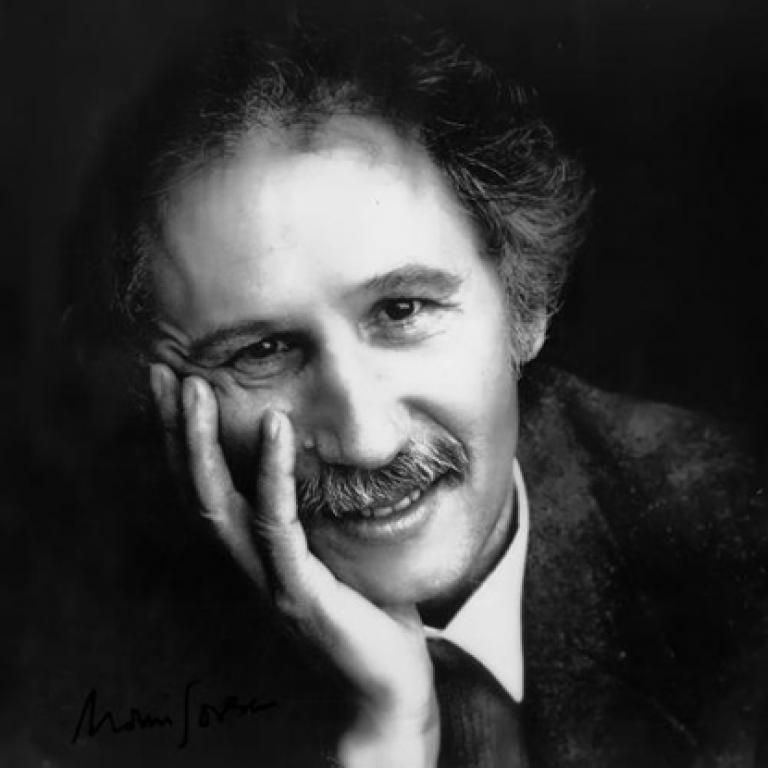
Marin Sorescu (1936-96) was a cheerfully melancholic comic genius, and one of the most original voices in Romanian literature. His mischievous poetry and satirical plays earned him great popularity during the Communist era. While his witty, ironic parables were not directly critical of the régime, Romanians used to a culture of double-speak could read other meanings in his playful mockery of the human condition. But later – like a hapless character from one of his absurdist dramas – the peasant-born people’s poet was made Minister of Culture, in Ion Iliescu’s post-Ceauçescu government.
Like Miroslav Holub in Czechoslovakia, Sorescu used plain, deceptively straightforward language, believing that poetry should be ‘concise, almost algebraic’. Seamus Heaney wrote that behind Sorescu’s ‘throwaway charm and poker-faced subversiveness…there is a persistent solidarity with the unregarded life of the ordinary citizen, a willingness to remain at eye-level and on a speaking terms with common experience’.
A prolific writer and a prominent dramatist, Sorescu published over 20 books of poetry in Romania, with several English translations of his poetry and plays appearing in Britain and America. Michael Hamburger’s translation of his Selected Poems (1983), drawing on six collections published between 1965 and 1973, introduced him to English readers. The Biggest Egg in the World followed in 1987, a selection of mostly later work edited by Edna Longley with translators including Ted Hughes, Seamus Heaney and Paul Muldoon.
Virgil Nemoianu has described how Sorescu’s black humour and keen feeling for the absurd enabled him to survive as a writer: ‘His reactions to an increasingly absurd political régime were always cleverly balanced: he never engaged in the servile praise of leader and party usually required of Romanian poets, but nor did he venture into dissidence. He was content to let irony do its job… His texts are masterpieces of allusion and adroit manoeuvring…’ All this time, however, he was also writing the ‘secret poems’ he dared not publish then because – as Dan Zamfirescu commented – ‘the gesture would have been the equivalent of suicide’. Censored Poems (2001), translated by John Hartley Williams and Hilde Ottschofski, is a selection from two books published in Bucharest after 1989, including borderline poems censored by the authorities as well as the risker secret poems censored by the author.
The Bridge (2004), translated by Adam J. Sorkin and Lidia Vianu, published in Romania in 1997, was Sorescu’s farewell to life, a book of painfully quizzical poems composed from his sickbed over five weeks – and dictated to his wife – as he waited for death to take him. Suffering from hepatitis and cirrhosis, he died from a heart attack on 8 December 1996, in the same year that he was nominated for the Nobel Prize for Literature.
Marin Sorescu was born in the village of Bulzesçti, Dolj, in the south of Romania, the fifth child of a family of peasants; his father – an avid reader – died when he was three. He published his first poems in 1959, in magazines. After studying Russian and then Romanian at the University of Iasçi, he became editor in 1963 of the literary journal Luceafarul, and from 1966 to 1972 was editor-in-chief of the Animafilm Cinematographic Studios.
He was able to take up overseas residencies from time to time, including at the University of Iowa (1970-71) and in West Berlin (1973-74 and 1990), and received many national and international literary awards. From 1978 he edited the literary review Ramuri, and in 1990 founded a new journal, Literatorul; he was also director of the Romanian Writer Publishing House. He usually managed to avoid direct conflict with the authorities, although in the early 1980s he was sentenced to three months of house arrest, and ran into difficulties over his work; 150 pages were cut from a large novel published in 1977. At times when he could not publish or, later in the difficult 1980s, felt very restricted, Sorescu, who had always drawn and doodled, often illustrating his books, began oil-painting with seriousness; his first one-man show was in Brasçov in 1989.
Introducing his work to a Berlin audience in 1990, Sorescu commented ruefully on the censors’ role in shaping his output: ‘Since my very first book, I have been a client of the censor’s. Irony is suspicious, and so is jokes… Everything I wrote was put under the microscope. Many poems were continually returned with the explanation “it isn’t the right moment” or “these verses could be interpreted”. I was able to put some of them into later books. Some I didn’t dare to print – on the contrary I hid them so well that even today I’m unable to find them…The permanent catastrophe of being delivered up to censorship has its good side. You’re sure to find a pair of faithful and attentive readers.’